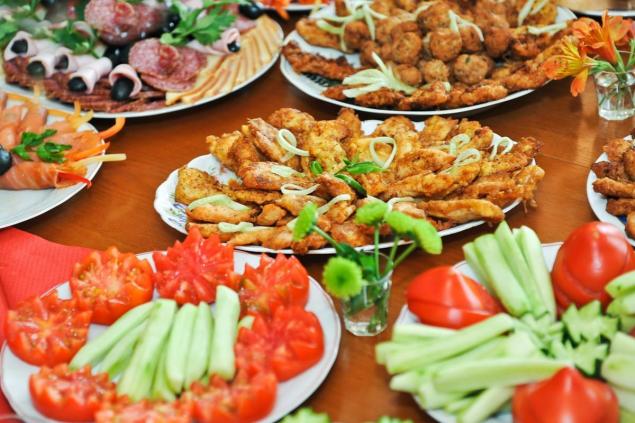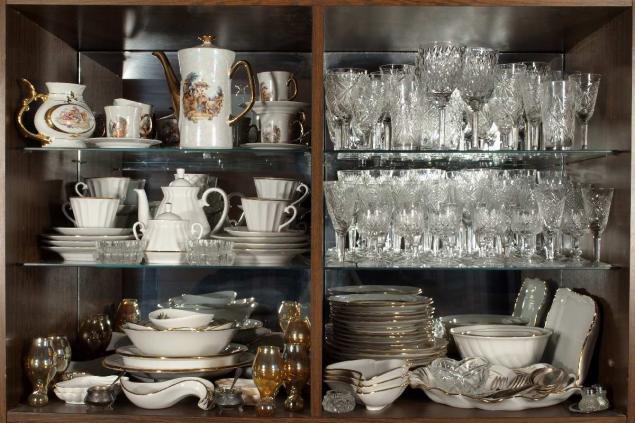213
Soviet habits that must be understood, forgiven and erased from memory
Habits in a person’s life are often crucial. It is not for nothing that philosophers say that you sow habit – you reap character, and you sow character – you reap fate. Therefore, it is so important to get rid of the habits of the Soviet era, which are firmly entrenched in our minds and prevent us from living in a new way.

GettyImages Habits in human life The habit of organizing lush feasts for any reason In Soviet times, a rich table served as an indicator of the security and success of the hosts. After all, many products were in short supply and getting them was not easy. Often food was stored in the fridge for months, then to shine in front of guests for the holiday. It is said, “Don’t touch it!” It's New Year's Eve!

But in the feast, the tables just burst with food. Home pickles, slicings, salads, meat dishes, poured fish, pastries and other goodies did not leave guests a single chance not to overeat. And very often such meals ended with the words: "God, why did I eat so much?"
The custom of serving bread to any meal did not come from a good life. Our ancestors survived famine, war, devastation. In those years, bread made it easier to feed the family. In the canteens, bread was given for free or sold at a small price. Therefore, many took 3-4 pieces at a time to satiate faster with a smaller amount of food.

Over time, the problems with food disappeared, but the habit of eating everything with bread in the older generation remained. Many parents have successfully passed it on to their children. So it turned out that with bread now eat not only soup, but even dumplings, pasta, potatoes. A spoon in one hand and a piece of bread in the other. “Eat with bread, or you won’t eat!” It's familiar, isn't it?
Empty shelves in stores and huge queues taught Soviet people at every opportunity to clog cabinets with canned food and groceries. Dozens of bags of buckwheat, bottles of vegetable oil and bags of sugar - without all this confidence in the future for many was not complete enough.

Today, the fear of empty shelves is mostly in the past, but the habit of hammering the shelves with necessary and unnecessary goods remains. So, in the spring of 2020, on the wave of fears associated with the coronavirus, citizens bought up an annual supply of cereals, canned food and, more difficult to explain, toilet paper for a month.
Tea sets, a set of "Fishermen" and beautiful crystal glasses for years adorned on glass shelves behind closed doors of the service. They took them out to use for their intended purpose, a couple of times a year. And if you're lucky.

Today, such furniture has become rare. But admit it, who among us somewhere on the mezzanine in anticipation of its finest hour does not dust a set that has not been used for ten years?
Balcony wars in apartment buildings is a separate topic. And while some complain that the neighbors on top hang out their laundry without squeezing, and someone again throws down unsweetened cigarette butts, others are fully turning their balconies into a storehouse of unnecessary things.
Carefully designed layered defense against NATO paratroopers: pic.twitter.com/J6d38H3SKn
— Maksim Mirovich (@MirovichMedia) September 15, 2021
What you can not see on our balconies: broken bicycles and rusty refrigerators, rotten furniture and sleds, which before the war was riding someone’s grandmother. All this junk is stored on the balconies for years, and what no longer fits, goes to decorate the cottage.
The habit of delaying a visit to the dentist Soviet dentistry is either in joke, or seriously called punitive. Therefore, to put an elementary seal, people have been gaining courage for years.
View this post on Instagram
Publication by Moskalev Maxim Dentist (@doctor.moskalev)
And today they reap the bitter fruits of those years, laying out fabulous sums for prosthetics lost in youth teeth.
Soviet people washed and used in the household any glass jar from pickles or jam. On the one hand, it reduced the amount of waste. But on the other hand, the already cramped apartments were terribly cluttered.

There's probably a box in your kitchen with empty glass jars. Why do you need it, if you have not been engaged in conservation for a long time, no one can answer intelligibly: “Let it be, it may be useful...”
A similar situation was observed with plastic bags. In the USSR, they began to enter into household use from the late seventies. At the same time, they were not disposable packaging, but were carefully used, washed as they were dirty and stored in a separate box. A reverent attitude to bags of polymeric materials remains among residents of post-Soviet countries today.
“When you smile, the whole world smiles with you.” – Louis Armstrong But it's in America. In Russia, we have a hard time grinding our teeth. It is difficult to say what caused this: a harsh climate, a constant struggle for survival or a historically established mentality.

Only the broad smile of a stranger makes us more angry than disposed to communicate. In our conditions, it looks unnatural, fake and even hostile, making us suspect some trick. Moreover, a smiling person is often considered weak, naive and short-sighted.
However, there are certain advantages in this situation. If a foreigner smiles at you, it doesn’t mean anything. Maybe he was taught that. And if for some time a harsh Russian smiled, be sure that he really likes you!
The article and the preview used photos.

GettyImages Habits in human life The habit of organizing lush feasts for any reason In Soviet times, a rich table served as an indicator of the security and success of the hosts. After all, many products were in short supply and getting them was not easy. Often food was stored in the fridge for months, then to shine in front of guests for the holiday. It is said, “Don’t touch it!” It's New Year's Eve!

But in the feast, the tables just burst with food. Home pickles, slicings, salads, meat dishes, poured fish, pastries and other goodies did not leave guests a single chance not to overeat. And very often such meals ended with the words: "God, why did I eat so much?"
The custom of serving bread to any meal did not come from a good life. Our ancestors survived famine, war, devastation. In those years, bread made it easier to feed the family. In the canteens, bread was given for free or sold at a small price. Therefore, many took 3-4 pieces at a time to satiate faster with a smaller amount of food.

Over time, the problems with food disappeared, but the habit of eating everything with bread in the older generation remained. Many parents have successfully passed it on to their children. So it turned out that with bread now eat not only soup, but even dumplings, pasta, potatoes. A spoon in one hand and a piece of bread in the other. “Eat with bread, or you won’t eat!” It's familiar, isn't it?
Empty shelves in stores and huge queues taught Soviet people at every opportunity to clog cabinets with canned food and groceries. Dozens of bags of buckwheat, bottles of vegetable oil and bags of sugar - without all this confidence in the future for many was not complete enough.

Today, the fear of empty shelves is mostly in the past, but the habit of hammering the shelves with necessary and unnecessary goods remains. So, in the spring of 2020, on the wave of fears associated with the coronavirus, citizens bought up an annual supply of cereals, canned food and, more difficult to explain, toilet paper for a month.
Tea sets, a set of "Fishermen" and beautiful crystal glasses for years adorned on glass shelves behind closed doors of the service. They took them out to use for their intended purpose, a couple of times a year. And if you're lucky.

Today, such furniture has become rare. But admit it, who among us somewhere on the mezzanine in anticipation of its finest hour does not dust a set that has not been used for ten years?
Balcony wars in apartment buildings is a separate topic. And while some complain that the neighbors on top hang out their laundry without squeezing, and someone again throws down unsweetened cigarette butts, others are fully turning their balconies into a storehouse of unnecessary things.
Carefully designed layered defense against NATO paratroopers: pic.twitter.com/J6d38H3SKn
— Maksim Mirovich (@MirovichMedia) September 15, 2021
What you can not see on our balconies: broken bicycles and rusty refrigerators, rotten furniture and sleds, which before the war was riding someone’s grandmother. All this junk is stored on the balconies for years, and what no longer fits, goes to decorate the cottage.
The habit of delaying a visit to the dentist Soviet dentistry is either in joke, or seriously called punitive. Therefore, to put an elementary seal, people have been gaining courage for years.
View this post on Instagram
Publication by Moskalev Maxim Dentist (@doctor.moskalev)
And today they reap the bitter fruits of those years, laying out fabulous sums for prosthetics lost in youth teeth.
Soviet people washed and used in the household any glass jar from pickles or jam. On the one hand, it reduced the amount of waste. But on the other hand, the already cramped apartments were terribly cluttered.

There's probably a box in your kitchen with empty glass jars. Why do you need it, if you have not been engaged in conservation for a long time, no one can answer intelligibly: “Let it be, it may be useful...”
A similar situation was observed with plastic bags. In the USSR, they began to enter into household use from the late seventies. At the same time, they were not disposable packaging, but were carefully used, washed as they were dirty and stored in a separate box. A reverent attitude to bags of polymeric materials remains among residents of post-Soviet countries today.
“When you smile, the whole world smiles with you.” – Louis Armstrong But it's in America. In Russia, we have a hard time grinding our teeth. It is difficult to say what caused this: a harsh climate, a constant struggle for survival or a historically established mentality.

Only the broad smile of a stranger makes us more angry than disposed to communicate. In our conditions, it looks unnatural, fake and even hostile, making us suspect some trick. Moreover, a smiling person is often considered weak, naive and short-sighted.
However, there are certain advantages in this situation. If a foreigner smiles at you, it doesn’t mean anything. Maybe he was taught that. And if for some time a harsh Russian smiled, be sure that he really likes you!
The article and the preview used photos.
While guests are discussing the series, I take out a salad with squid, "Sea foam" is scattered in a flash
My husband works as a chef, evaluates the dishes I prepared, shames my family.
























